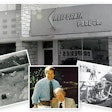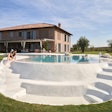
"What got you to where you are today is different from what you need to do to get there tomorrow," says Bill Weber, the association's executive director. "The first thing we had to do was perform at a higher level than the organization had performed at before." Before Weber was brought in as the executive director in 2005, the organization had faced a number of hardships, mostly resulting from the 2001 settlement of a lawsuit that left the association bankrupt and scrambling to reorganize.
Because the lawsuit was so time consuming and involved some sensitive information, members began to view the organization as secretive and out of touch. It was time for a change.
To regain its financial footing and pay the terms of the lawsuit, the association did something seemingly dramatic - it sold the International Pool and Spa Expo, the industry's biggest trade show and the organization's main source of income and distinction. Next, with the knowledge that the group would have to find other means of bringing in money and appealing to its members, the board brought in a consulting firm, Tecker Associates, to facilitate the association's reinvention. The board, staff and membership put in hundreds of man-hours to reach consensus on what the new organization would look like and act like, and a strategic business plan was approved in late 2004. With an agreed-upon core purpose to enhance the business success of its members, the group identified four goal areas, called "pillars," to support its progress.
These pillars - education, promotion, advocacy and research - are the basis for everything the APSP does today, from providing certification programs to lobbying on Capitol Hill. But it wasn't until two years after the board established the new strategic plan that it found the perfect person to implement it, says Lauren Stack, director of marketing and promotions.
"[Weber] got the right people on the bus, sitting in the right seats. That's really a mantra of his. He brought a lot of key people into the organization that weren't part of the staff before. He altered responsibilities and let some people go. All of that has made for a pretty effective team," Stack says. "He's been a real leader, not just a puppet of the board of directors."
Weber came on board with what most agree has proven to be the perfect background in law, government and trade associations. He had worked as a counsel to the Senate Banking Committee, as a lawyer in a consulting business and in association management with the Farm Credit Council. He understood the ins and outs of the legal battle that found the organization liable for a case pertaining to standards. Stack says he figured out the types of skills the organization would need in both its volunteers and its staffers to succeed. And most importantly, he had a forward- looking vision of an organization that could provide unique value to each of its members.
Brick By Brick
In addition to reorganizing the staff, Weber and the board restructured the organization itself. This meant abolishing the independent legal entities around the country that were affiliated with the APSP and creating Regional Service Centers. The centers report directly to headquarters and have budgets managed by the APSP.
"When we had the show and money was flowing in, the organization used to rebate money back out to respective regions and chapters almost with no strings attached. We realized very quickly that more fiscal restraint was going to have to be used," Weber says. "This gave us an opportunity to recruit some very capable people. We created a whole network of regional staff that now work together very effectively."
The Pillars
Everything that the new regional centers do, and all of the programs that headquarters implements, are based on the idea that the organization is the industry's greatest ally, providing education, advocacy, research and promotion. The change of the organization's name to include the word "professional" was very intentional, Weber says. With different constituencies among its members seeking certification in building and servicing, the organization aimed to provide stronger education services. An in-house education task force developed the Career Institute, a series of upgraded certification programs that will also be offered online and through similar distance learning technology, giving even more members access.
Related to education is research, which largely focuses on both developing and training on industry standards and best practice standards. The APSP (then called NSPI) was certified as an accredited standards developer by the American National Standards Institute in 1983 and today provides enhanced guidance to ANSI in updating industry standards involving safety measures, construction and, increasingly more prevalent, energy efficiency, among others.
Where the association has made great strides is in the area of advocacy, which helps ensure that local, state and even federal laws aren't unreasonable for any segment of the industry. In this goal area of the strategic plan, top objectives included becoming more proactive and focusing on emerging regulatory trends.
This year the APSP has devoted resources to consulting with members of Congress on the Pool and Spa Safety Act, which outlines safety standards in line with the layersof- protection concept and offers states incentives for codifying the standards. "You are dealing with a lot of members [of Congress] and staff who don't know anything about the intricacies of dealing with pools and spas," Weber says. "We have the expertise. We are fundamentally trying to make people understand the reality of what's involved in swimming pool design, service and safety. We're not a heavily regulated industry, but where we are regulated, it has a very serious impact on what is and what is not permissible."
The advocacy pillar is important to all members of the industry, says Charlie Schobel, the incoming secretary/ treasurer of the APSP board. "There are things that an association can do that the industry members alone can't," he says. "An industry absolutely needs an organization to help it grow and to fight for it, and this organization has just gone through a massive change, but it's absolutely back on sound footing and moving forward."
Part of protecting the industry also means promoting the industry's new developments, methods and ideas, and the APSP is well positioned now to do so. Working with a communications and public relations team, a Web-hosting company and a marketing team, the association will be upgrading its Web site, has launched a weekly enewsletter called Industry Currents and has plans for a quarterly APSP magazine. It also aims to provide support to various segments of the industry in promoting its products. For example, the APSP is currently heavily involved in providing support to its segment councils, including the Hot Tub Council's planned image campaign, which will be aimed at raising the public's interest in hot tubs.
Membership
Efforts are also in place to get the word out about the changes in the organization itself and what the association can offer both its current members and prospective members. Not only is the organization back on track financially, but in the last year membership has increased by 10 percent, which is the APSP's goal for the upcoming fiscal year, as well.
The association will still be challenged to be viable on an operating basis and will have to figure out new ways to reach out to potential members, especially as increasingly complex backyard construction calls for an even more elaborate relationship between pool and spa builders and other industries, Weber says. APSP staff and members say they are confident they'll get there under Weber's leadership. "[Weber] has a nice, quiet leadership style that brings people together to find solutions to problems," Schobel says.
Weber attributes the organization's success to the passion and talent of those in the industry he works with. Ultimately, Weber says he wants to see the day when every person in the industry is also a member of the organization. "Everybody who has an interest in the success of the pool and spa industry, whatever that connection may be, should be able to say without reservation, 'I cannot imagine not being a member of the APSP,'" he says. "That's really what it comes down to."






































